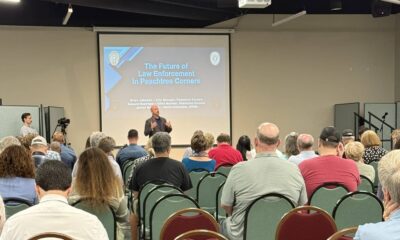Business
Two Craft Brewers: Facing Challenges, Creating Opportunities, and Branding their Own Local Identities
Published
4 years agoon
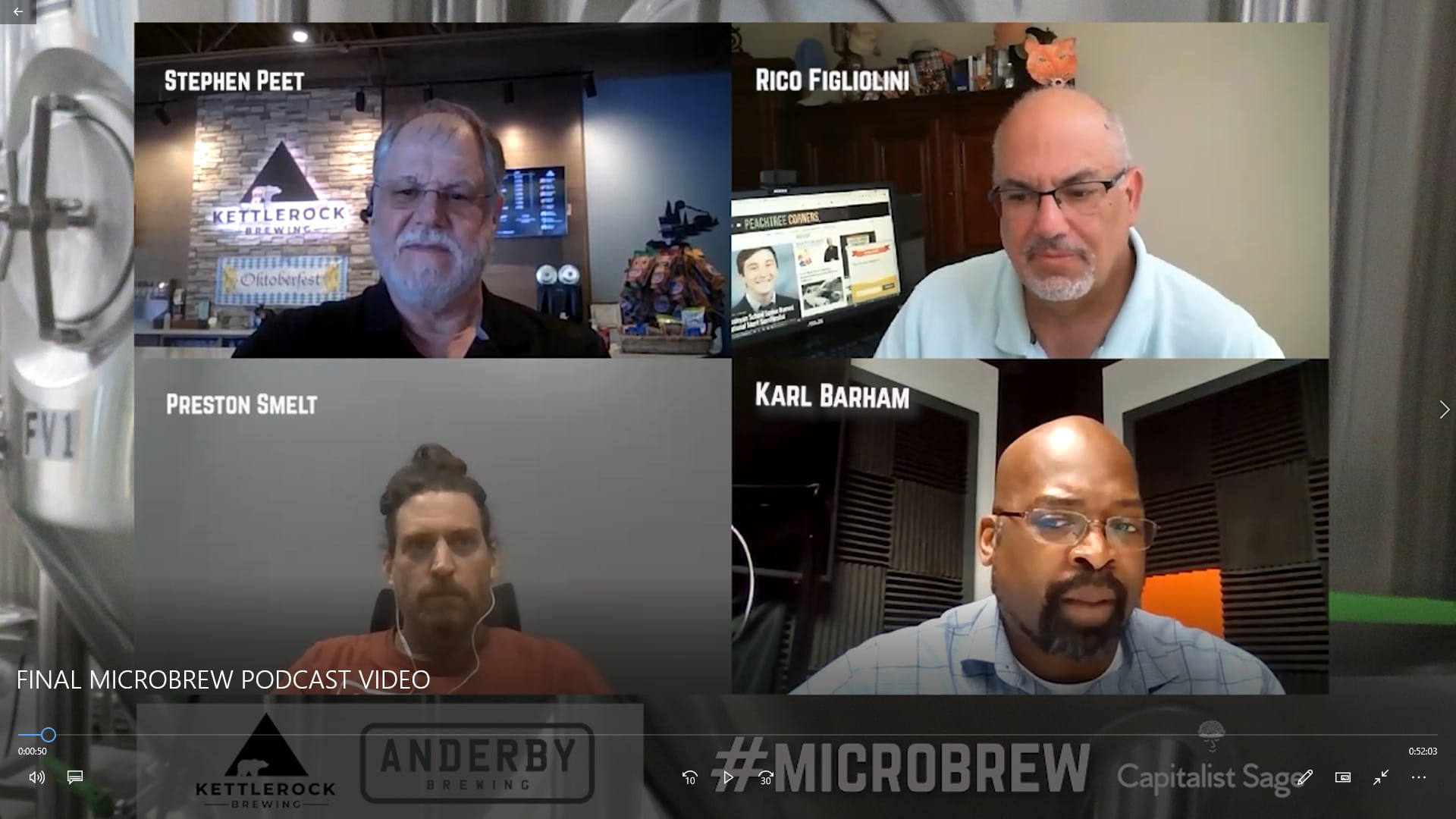
There’s a lot more to the Brewery business than just making beer. Despite the challenges facing businesses today, Anderby Brewing and Kettlerock Brewery have found their path. Their owners, Preston Smelt and Stephen Peet (respectively) talk about the collaboration as well as the competition in this line of business. Plus, they take an in-depth look at shippers, licensing, the marketplace, solving supply chain issues, and more. Join your hosts Karl Barham and Rico Figliolini with their latest Capitalist Sage Podcast.
Resources:
Kettlerock Website: https://kettlerockbrewing.com
Kettlerock Social: @KettlerockBrewing
Anderby Website: https://www.anderbybrewing.com
Anderby Social: @AnderbyBrewing
PC Mashers Homebrew Club: PCMashers.com
“As soon as you open your doors, you’re no longer brewing for you. Your personal tastes don’t matter anymore. You’re brewing for the people who come into your doors, or in my case are ordering us at restaurants or picking up cans at package stores. And so what I want from a beer, 9 times out of 10, doesn’t matter if that’s not what the consumer is willing to pay for. It’s the biggest change from homebrewing to being a commercial brewer, you’re a business now. So your personal tastes no longer matter if people are not willing to pay for it.”
pRESTON sMelt
Timestamp:
[00:00:30] – Intro
[00:01:46] – About Stephen and Preston
[00:03:23] – How Preston Got into Brewing
[00:05:33] – How Stephen Got into Brewing
[00:07:50] – Trial and Error and Making Beer for the Consumer
[00:11:38] – Regional and Seasonal Beers
[00:15:12] – The Business Models of Brewing
[00:22:17] – The Exciting Part of This Industry
[00:30:08] – How COVID has Impacted the Breweries
[00:31:47] – Supply Chain Issues
[00:39:18] – Upcoming Events at Both Breweries
[00:42:07] – Closing
Podcast Transcript
[00:00:30] Karl: Welcome to the Capitalist Sage Podcast. We’re here to bring you advice and tips from seasoned pros and experts and help you improve your business. I’m Karl Barham with Transworld Business Advisors, and my co-host is Rico Figliolini with Mighty Rockets Digital Marketing, and the publisher of our local and favorite Peachtree Corner Magazine. Hey Rico how are you doing?
[00:00:50] Rico: Hey, Karl. Good, thanks. Been a beautiful day after all that rain.
[00:00:54] Karl: It is, we are here in fall, which is going to lead to a fun topic today. We’re going to talk about a brewery. Local brewery businesses here in Peachtree Corners and surrounding areas. And we’re really honored to have Stephen Pete CEO of Kettlerock Brewing as well as Preston Smelt with Anderby Brewery to share a little bit about their experience. But first, why don’t you introduce our sponsors today Rico?
[00:01:19] Rico: Sure. Peachtree Corners Magazine is the sponsor of this show along with the family of podcasts that we do. Including Prime Lunchtime with City Manager and Peachtree Corners Life. We’re working on our next issue right now, actually. It goes to the press late next week. And you guys will be getting it the first week of October. It’s going to be a good, full packed issue. So I’m all excited to get it out and off my hands. So it’ll be in the mailbox hopefully sometime the week after next.
[00:01:46] Karl: Excellent. That sounds great. Well, I’m going to re-introduce my guests. The first is Stephen Peet, the CEO of Kettlerock Brewing. A local brewery business right here in Peachtree Corners. And he’s joined by Preston Smelt of Anderby Brewery, located in the Atlanta Tech Park area of Peachtree Corners. Why don’t we start off by Stephen, you introducing yourself a little bit and then we’ll have Preston give a quick bio and introduction.
[00:02:12] Preston: So I’ve been in Peachtree Corners here for a little over 30 years now and been involved in the community. The entire family has been involved in the community and the entire family is involved in kettle rock brewing. I’m not sure what all else you need to know other than come by and have a beer.
[00:02:30] Karl: I appreciate that. Preston?
[00:02:34] Preston: Yeah. My name is Preston Smelt and I’m president and head brewer here at Anderby Brewing. And we’ve been open since the end of July of 2019. So we got open just before everything went to hell. So we’ve been here just over two years, getting ready to actually hold our official second birthday party here next month. We’re going to be excited to get a lot of new stuff out for that. And a nice, big, outdoor area for everybody to come enjoy this nice fall weather we’re finally getting.
[00:03:00] Karl: Yeah. I’m excited for this season and getting out to visit both locations. But let’s talk a little bit, start by talking about, why the brewery industry. And we’ve seen a whole lot of new activity and businesses in this. What made you, and if I could start with Preston, get into brewing? How did you get into it? What made you think about opening up Anderby?
[00:03:23] Preston: All of our stories, I think we’re past the 7,000 brewery mark in the United States, a lot of us have a very similar story. Most of us started home brewing as did I. My wife bought me a Groupon to Brew Masters Warehouses, an old place in Marietta. That’s I think closed now that was doing a Learn to Homebrew class. This was seven, eight years ago. Loved it and immediately bought everything we needed to brew out of the kitchen while I was there. And then it just quickly expanded. It went from just little five gallon batches on the stove top to 15 gallon batches. They’re on a custom rig that I built in my backyard. And then that grew into a one barrel system in my garage, which then, two years ago grew into a 10 barrel system here at Anderby Brewing. So it escalated pretty quickly over seven years. And during that time, I also went and studied with places like The Siebel Institute out in Chicago, which is one of the country’s leading brewing schools for professional side to kind of hone everything in. Knowing this is what we wanted to do at some point in time. Got it done in the summer, right before we opened, actually. And yeah, then decided to open a brewery. SB85 passed, I don’t know what was that? 2017-ish if I remember. Yeah. So that allowed, this tap room model that you’re seeing us, Kettlerock, Social Fox, Cultivation, all the new breweries that are opening up are all following this tap room model. It allowed that to actually happen in the state of Georgia. Prior to that, you can only do tours and you had to be relying on distribution. You couldn’t just open a neighborhood tap room and survive. But as soon as SB85 passed, Peachtree Corners was one of the first kind of Northeast perimeter cities to adjust their local laws, to allow for this to happen. Which is a necessary step. I live in Dunwoody. I really wanted to put this in Dunwoody Dunwoody, not that, not that much foresight. So Dunwoody lost out on this opportunity. So we found a great place here in Peachtree Corners with a great landlord and made it happen. The city’s has been phenomenal to work with. And that’s kind of how we ended up here.
[00:05:24] Karl: How about you Stephen? Your experience and why you got into it. And you’re doing it as a family endeavor, so that brings an extra interesting aspect to this.
[00:05:33] Stephen: Absolutely. So it’s my wife and I. Diana and I are the owners and all four kids are involved in the brewery. Everyone has a full-time job outside of this. I’m the only full-time person that’s here at the brewery right now. Everybody’s just helping out in different areas. So my two oldest boys have been home brewing for 10 years now. And we are the founding members of the PC Mashers Homebrew Club here in Peachtree Corners, which if you’d like to be involved in that check out PCMashers.com. We meet the third Wednesday of every month. Most Homebrew clubs are bottle shares and ours is a bottle share as well. However, we have a style that we brew to each month and then we compare our beers to each others. And what that allows us to do is to help each other brew better beer. And a testament to that is that we entered the Suwanee Homebrew Fest a couple of years ago. And Sterling had not been wanting to enter beers in contests. I don’t know why, just he grumbles about that. But he did and he won second place with what is now our Float Trip IPA. But the Homebrew Club was first place in that competition because enough of us had gotten better. Enough of us had entered. There’s only about 10 to 14 of us in the club and enough of us entered and metaled. So that’s a testament to us all getting better. The local growler store Peachtree Growler had changed hands and had been talking about opening a brewery or brew pub in Peachtree Corners. And since that changed hands and didn’t happen, we kind of took that up. And decided as a family we could make this work. And Sterling is still the head brewer. Started out and still is. My daughter, Krista is actually one of the assistant brewers. And my second oldest Taylor, who was doing home brewing with Sterling. He’s one of the assistant brewers as well. And then Devin does marketing and everybody does a little bit of everything as you might guess when you’re a small business like this.
[00:07:50] Rico: It’s interesting because this business has, you have to have passion for this business, right?
[00:07:55] Stephen: Absolutely.
[00:07:56] Rico: Because it’s trial and error on almost every batch you do.
[00:08:01] Stephen: You’re right.
[00:08:02] Rico: So mistakes happen, I know. I was discussing with Preston last week when I visited with him at Anderby’s, it’s just like my father when he made wine at home. Because he was a wine maker at home for himself, three whiskey barrels was enough for the season he felt. He shared a lot of it with friends and family around Brooklyn. But you know, it’s trial and error. That’s one season of making grapes. You guys are constantly making different brews, adding different things to it, flavors and stuff. So how do you learn to do that? I mean, I know how Preston learned to do that, obviously. Getting formal education to a degree. But still right, Preston? I mean, you’re, still doing experimenting. That’s the best part of this, isn’t it? Being able to do that?
[00:08:48] Preston: Oh most definitely. I mean, there’s a lot of ways to learn. And Dana, my assistant brewer she’s a grad student, getting her master’s in microbiology. Which is a great asset to have in a field that is really, it’s part chemistry, part cooking, kind of all right. It’s an art and a science. And so we do a lot of experimenting. We brew on average twice a week, every week. So you can imagine we go through a lot of beer. And out of all the beers we make only five or six are staples, right? So everything’s, brew one time, move on, brew something different the next time. And so that allows you to iteratively learn. But then you also start to build connections within the brewing community, both in Georgia and in other states. And then you start to say, Hey, I really like this beer from you. How did you do X? Whatever it might be. It might be a fruit. How are you adding your fruits to your beers? There’s a lot of ways you can fruit a beer. You could put them in on the hot side. You can put them in pre-fermentation. You can put them in post fermentation. You don’t have to use real fruit at all. You can just use artificial flavors if you want to, just for whatever you’re trying to do. There are a lot of ways to accomplish things and trial and error is the best way for you to figure out what works for your system, for your pallet, for your customers. What works for the drinkers here in Atlanta may not sit well with the drinkers in California. So you have to kind of balance, what is your market? What is your demo preferring? And then make adjustments. And the first thing you learn, and I’m sure Stephen and then Sterling in the team at Kettlerock can attach to this. As soon as you open your doors, you’re no longer brewing for you. Your personal tastes don’t matter anymore. You’re brewing for the people who come into your doors, or in my case are ordering us at restaurants or picking up cans at package stores. And so what I want from a beer may 9 times out of 10, doesn’t matter if that’s not what the consumer is willing to pay for. And when you’re a business, it’s the biggest change from home brewing to being a commercial brewer is, you’re a business now. So your personal tastes no longer matter if people are not willing to pay for it.
[00:11:01] Stephen: That’s a really good point. And I’m going to throw out, Hard Seltzers is a big example of that. Most brewers will look at a hard seltzer and say, that’s not beer. That’s not beer. But Sam Adams, their major income is hard seltzers. Sam Adams is a beer company, but that’s their major income. That’s most breweries, micro-breweries will have a seltzer. It’s just something you have to have, because as Preston says, that’s what the market desires. That’s what the people want.
[00:11:38] Karl: Can I ask a question along that line? So, everything is local. If you’re from New York or Boston, there’s going to be certain pallets and tastes in what’s popular. If you were to describe what’s popular here in Georgia, or even in Gwinnett county and in the surrounding areas, what would be popular? In your opinion, in this area? And in specifically for each of you, what do you find to be some of the things that you do differently?
[00:12:04] Stephen: Well, that’s kind of a hard question, because I’m going to say that if you were in California, West Coast IPAs are the thing. That is the thing, a hoppy, hoppy beer. In Atlanta, people like hoppy beers. But not to the same extent, I think, as in folks along the West Coast. So that’s one example. Another would be, I think the fruit sours and such like that, that’s a little more of a Southern thing. It’s certainly, big breweries are, big microbreweries, I gotta be careful with that, are making sour beer. So clearly it’s a thing everywhere, but I think it’s a bigger thing when you’re talking in the south, in warmer climates.
[00:12:47] Preston: And I would echo a lot of that. You know, during the summer the fruity sours were a very good seller for us. We personally have seen that taper off here over the last month or so. I know regionally or in the Metro area, it’s tapered off a little bit. But the new England style IPA, the big hazy ones, those are ever popular. Whether they’re being made by us or importing from breweries from other states. There are a lot of the hazy IPA’s moved very fast. The Atlanta beer community also has a pretty big heavy stout following, right? So there’s a big portion of the Atlanta beer drinkers that love that big, heavy sweet stout, right? A candy stout or a flavored stout, things of that nature. And those are not easy to do well, right? To balance the boozy-ness of a 13% Imperial stout with that thickness, with the sweetness and whatever flavors you’re trying to introduce. And we’ve got a few here in town that are doing well. And there are a few heavily sought after breweries in the greater region. Especially with some of the guys out of Florida, that do this stuff pretty well, also being sought after. So, that’s where I see the beer drinker being right now as we move into the fall. I definitely think the bigger, darker beers are gonna turn on. It’s weird. I hear a lot of people ask for a lot of the classic styles, blonde, English mild, but it’s weird because as a brewery, they don’t sell as much. So people seem to, there was a vocal minority that wants these types of beers, but then when you have them, they don’t move as quickly as the others. And, you know, beer does have a shelf life. So that’s something that you have to kind of weigh. I also think some of the classic styles cannibalize each other in sales. So if you have too many at one time, none of them are really going to sell well. So you’ve just got, like for us with 19 taps. We just have to be careful how many of each style we have at any one point in time, because then everything will just cannibalize each other and then it just, some of it can go bad and we have to dump it and that’s not fun.
[00:14:45] Stephen: So beers tend to be more seasonal, I think, than regional in a sense. I mean the darker beers, the heavier beers, the barrel aged beers, those tend to be in the winter months more interested by the consumers. And obviously in the summertime, then you’re looking for, as they call it lawnmower beers, porch beers, poolside beers, things like that. So there’s certainly a seasonal aspect of it as well.
[00:15:12] Karl: I’m curious about the business side of this, the different revenue models. Can you describe some of the options you explored in your businesses? And which ones you really found to be areas that you want to focus on?
[00:15:27] Stephen: In our case our business model is, right now is just the taproom. Draft beer sales right here at Kettlerock and also hosting events. We’ve already had a number of events. We have a number of events that are scheduled. That’s a big deal. We’re going to be doing distribution and that way we can have our beer available in the local restaurants and the local stores and such like that. So obviously that’s a future. The other business model, which is typical of microbreweries is having some entertainment here, be it trivia or music. We’ve just started the music. The issue with that is licensing. You can’t just say, oh, I want to have some music in the taproom and I’m going to turn on the radio. No, you have to have the right thing that’s been licensed properly and paying for that with ASCAP and BMI. And when you have live entertainment, then you have to pay BMI and ASCAP directly so that the royalties go to the right people and all that sort of good stuff. So we’ve just started that. We’ve had two events, two of the same band and one of another. And we’ve got some others coming up. And others that have been interested in coming by and playing for us. So that’s kind of our model at this moment. And then, like I say, we’ll be getting into the distribution.
[00:16:50] Karl: Preston, how about you guys?
[00:16:51] Preston: As a brewery there’s really two ways to make money. You drive people into your taproom or you distribute. We do both. We’re trying to do both. We picked our location because of the dearth of offices that had lots of people working in them in 2019. So you know, our challenge on the taproom side is that there aren’t as many people working in Tech Park as there were two years ago. So that’s been a weekday challenge, especially. And there’s only so much you can do on the weekends. So yeah, we do trivia. We have a very successful trivia night .It’s probably one of our most consistent best days of week. We’ve been running it short of the shutdown period, pretty much every Thursday night since we opened. So it’s become a regular. We have, five, six regular teams that come and play every week with us. So it’s a fun event here, which does help. The live music we have a licensing now. We definitely have a band scheduled for our second birthday party in October. But it’s a catch 22. And for the longest time, I just refused to do it simply because of what Stephen was talking about with that licensing. That is the best racket out there. They charge you based off how many people they physically think can fit in your building, whether or not you ever have that kind of foot traffic. Fire Marshall codes may include your production facility as part of your occupancy number. Even though you’re not going to let people just hang out in your production facility and in our case, it’s closed off. You physically can’t go back there. You know, including that in our occupancy numbers drives up our price point on things like music licenses. And we’ve finally been able to negotiate with those guys to get something reasonable. But then yeah, then you have to pay a band. You have to make sure that whoever you hired to do live music fits the vibe of your establishment. We, my wife and I, Michelle, she manages all of our sales and marketing and does all of our social media. Our vibe is hard rock. We are hard rock fans from across multiple generations. So like our typical station here is rock ball. All of a sudden we bring in blues guitarists. While I love blues guitar, that’s not the vibe and the ambience that we’ve created here. And so then it doesn’t fit. And then our customers are confused by it. Like, how does this connect to Anderby? So we have to always like, we’re very careful about when we do bring in light music or consider artists. We’re staying true to who we are and the brand that we’ve established is Anderby Brewing and not just hey, some guy with a guitar showed up. We’re just gonna let him set up and play. Which people do they show up with the guitar and say, Hey.
[00:19:24] Stephen: I had one last week show up.
[00:19:28] Preston: Yep.
[00:19:28] Rico: Everyone’s looking for a gig, right? Everyone’s looking.
[00:19:32] Karl: On one side you have that, but then, there’s the open mic kind of vibe where folks are coming in and they’re trying.
[00:19:40] Preston: We tried comedy night. And it was fine. We’ve tried a lot of things and this is a business podcast, right? So you have to look at ROI, right? If you make, I’m just gonna throw out numbers, if you make $2,000 on a Friday. And remember we’re talking beer sales, like both Kettlerock and I, we only make money on beer sales. 6, $7 a glass, you’re pouring a lot of beer to get to $2,000 in sales. And then all of a sudden, some band comes up and says, Hey, three hours, Friday night, $500. And you’re like well, you may be worth $500 because you’re good. But am I going to increase my sales by at least $500?
[00:20:15] Stephen: Exactly.
[00:20:15] Preston: Preferably more, because if the answer’s no, then go away, right? No, there’s no point in doing it. And so every time we evaluate this is what happened with comedy night. Like we closed our doors to the public, ticketed event, sold beer by the pint. And I think we actually lost money on the deal because I think we turned away more regular customers who didn’t care about the comedy night and just wanted to come in and drink beer. Then we would have gotten on ticket sales. So it’s just, you have to be very careful in how you evaluate events and understand what the ROI is and what ROI you need. Especially if you’re going to be outlaying money to do it.
[00:20:50] Karl: Oh, that’s a very good point. And a lot of that comes with, you know, you try some things. And there might be, what is it that your ideal client would be willing to pay or could draw in more? And at the beginning and in an area when you bring anything new, it’s feeling that out and trying it out and trying to get that established. And you can see a lot of businesses will struggle with that early on, but then they’ll find their niche. I remember the local restaurant that did blues and a band that came on the Sunday night, band that would play. And it had been doing it for 10 years. And I will tell you, it would absolutely be like people can not get in the door on that night. But they had established that as a thing. They had a promoter that probably helped promote that. And it was their thing. And it drew enough extra people to obviously more than make the ROI on that. But of course, that probably didn’t happen the first night they did it. They probably had to invest in it over a long period of time, build up a following, et cetera. So those are all some of the challenges that business owners have to go through. So that makes perfect sense. If I could broaden out a little bit, help me understand some of the trends you’re seeing in brewing that you’re intrigued by. Is there things that are happening new in the industry that you think, that’s getting you pretty excited?
[00:22:17] Preston: I’ll take this one first. The best thing about this industry is everybody’s always trying to innovate. And so the argument now is who invented the hazy IPA, right? The new England style IPA. A couple of breweries tried to claim credit for it. And then you hear people in Chicago saying, oh, no, we were making them around the same time. So everybody’s always trying to innovate and find the next thing that hits at a macro level. Because that can put you on the map. Creature Comforts found Tropicalia and it blew up and then they blew up because of Tropicalia blowing up. So the best thing about this business is everybody is always trying different stuff. Again, we’ve brewed 60 different beers this year. Just this year, right? That doesn’t even include last year or the little bit in 19. We’re always trying things and saying, Hey what worked, what didn’t, what flavor combinations work? What flavor combinations didn’t? We have hundreds of grain varietals at our disposal. We have hundreds of hop varieties at our disposal. We have hundreds of yeast varietals at our disposal. Every single one of those bring their own unique flavor to a beer. Stephen and I could make the same beer using the same ingredients, it maybe radically different just by the ratios or the timing of when we use certain things or didn’t. You know, it’s a fun business. And that’s what I love about it. There is such a thing as bad beer. You can make a bad beer and that does happen. But the reality is everybody’s just trying to innovate and you have to be willing to take chances and try something new. Or you’re just going to squander in obscurity, just making the same stuff everybody else makes. And that’s the trick.
[00:24:00] Stephen: I want to take that just a little bit differently and I’m going to say one of the things that’s really cool about this industry that I’ve enjoyed before we started in it. I knew that it was happening. And I’m going to take two words out of, first robotics, core values, and philosophies. Gracious professionalism and coopertition. The craft brewing industry is very cooperative. And obviously there’s competition. There’s competition between Preston and I obviously. I’m selling beer, he’s selling beer. Clearly my beer is better than him. From his point of view, his beer is better than mine. Or our beers compliment each other, depending on which styles I have. And he doesn’t and which styles he has that I don’t. So you have both of those things going on. The other day, he ran out of nitrogen. I have a tank. He can borrow my tank until he gets it. That’s no big deal. You’ll see the Georgia Craft Brewers Guild actually facilitates this. And also the brewers association helps a little bit. But with the craft brewers Guild, for instance, somebody had put out an email blast, Hey, I was supposed to get 500 pounds of Pilsner malt and it didn’t come in. Does anybody have some and somebody else goes, oh yeah, sure. Come and get mine. You can either pay me for it or replace it. I mean, how many other industries do you see doing things like that? That’s been an incredible trend that I’ve seen before we got involved in it. And since I’ve been involved in it. I think it’s really cool.
[00:25:37] Rico: I mean, that’s because it is a passionate business. It is artists and it is people crafting, literally crafting, you know, art. I mean, that’s what it is right?
[00:25:48] Stephen: It’s an art and a science. There’s no doubt there’s a science to it, especially for repeatability. Measuring and all those sorts of things. But then there’s the art part just like Preston was saying with cooking and baking,
[00:26:01] Rico: Because when do you stop the fermentation or when do you heat it? What temperatures you go? I mean, it’s just really something that most people should appreciate.
[00:26:11] Preston: The great thing that we’ve seen here, is we have four breweries all in the Peachtree Corners, Norcross area. So what is that, three miles? I think the farthest distance from any one of us is three miles.
[00:26:22] Stephen: Yep.
[00:26:22] Preston: All four of us are doing, we’ve all created a different vibe. We all have our own way and approach to how we make beer. And there’s enough uniqueness, especially between the four of us right now that we’re all doing something different. The coopertition side of things. I came out of the hotel industry and we used that a lot, especially in downtown Atlanta. Where we were always, yes, we were competing, but at the same time, we’ve worked together on things too. Cultivation and I have a collaboration in my tanks right now that we’ll be releasing in November. They came here and we actually brewed together for an entire day and that collaboration’s coming out here in late November. So we do work together on a lot of things, but we are also competing for the same people. Especially, in a limited demand cycle we’re in right now. But we’re also all doing enough things differently. And we’ve found our own voices that it’s not really direct. There are things Cultivation does very well that I don’t do. And I can’t. Just to be honest with my scale versus compared to their scale, I just can’t do it. Likewise, there are styles that we’re making that are just a little bit different and we put a different twist on it then everybody else around town. So it works harmoniously. And it should be, right? Downtown Asheville has almost as many breweries just in downtown Asheville as the entire Atlanta Metro has. There’s like 50 breweries in Atlanta metro. There’s not quite that many downtown Asheville, but there’s definitely like 20 you could just walk to. They all coexist and they all coexist because they work together. They all find their own niche in what they want to focus on and what they want to specialize in versus what everybody else is doing. And it starts to create a community and bring people in. And that’s what we’re trying to do between the four of us with the Norcross Peachtree corners community. Is get people to come in from Roswell or Stone Mountain or Duluth or Suwanee or wherever else. There may be beer crowds that are reasonably drive in. Come spend a day in Peachtree corners in Norcross and experience all four of us.
[00:28:18] Rico: This is so different from other businesses. It’s almost like shoe business in a way. Where people want to see five stores because they’re going to go visit each one of them. That’s almost what it’s like, isn’t it? I mean, you want to be able to know the city has three or four or five places. You can just bounce around and try everyone’s brew.
[00:28:36] Stephen: Yeah. I have several customers that come in and say, you’re one of the four I’m going to. I’m supporting all four of you. And I get a different beer at each place.
[00:28:45] Karl: And I could say even expanding. I spent 15 years traveling, corporate, to meeting salesman, client meetings. And you’d spend all day in a conference room or meeting rooms working through meetings. And in each one of those, if you flied in on Monday, there’s a Monday night, Tuesday night, Wednesday night, possibly Thursday night before everybody flied out on Friday. And I used to admire the staff that would coordinate all of that. People are in hotel rooms. There’d be dinners every night. And there would be pre dinner, there would be dinner and there would be post dinner. And very often in some cities we’d go to a brewery first, and then we’d go to dinner somewhere. And then those would go back and do work in their rooms or sleep. And then there’d be a group that would stay a little bit later and go to another. And so we always looked for cities and towns that had enough of those kinds of places so that you can feature different places. So as the economy comes back and people start coming back to offices and people start doing conferences again, I could see having this group of breweries and in both of the two in Peachtree Corners and have options, that’ll make it easier for people planning meetings and hosting meetings. To not have to think about do we have to go to one place every night? Nope, you’ve got options and everyone ends up winning and being successful in that.
[00:30:08] Rico: And I think, Preston when we had our conversation last week. You mentioned that in March, between like March and May or something? Around that area. When people were finally looking like they were opening up, coming back, things would be, this was before the variant came, the Delta thing. But you mentioned that it was like you saw a window of what it would look like once we were back to a place where everything was open and that was a good place, wasn’t it?
[00:30:33] Preston: Oh, yeah, it was great. It was, yeah, it was like a 10 week window that we got of, this is what life would look like. It’s a brewery, it’s on Tech Park with even just a hint of normalcy. Like we weren’t even back then, there wasn’t even really, truly normal. We were just closer to normal than we had been since March of 2020. And we just got that little glimpse of it. And then, yeah, by the end of June, July, all of it was gone. It was just back to nobody’s going out. I mean, anybody who knows Tech Park or that’s listening to the podcast, four o’clock at Tech Park prior to March of 2020 was a nightmare to get in out of. There’s just lines of cars, either side, all three, four exits out of Tech Park, all of them were backed up. There was no good way to go. I used to sit on the patio during build-out and just watch 45 minutes of traffic of just people trying to get onto Spalding. And you’re like, yeah, this location is going to rock once we can get to the spring. We just need to get to spring. And now you go sit any day of the week on Tech Park and at four o’clock and you may see three, four cars. And so we got a little bit of that in March and April, May. And then by June, it just all started to evaporate again.
[00:31:47] Rico: So I want to ask another question if you don’t mind. I guess to either one, so maybe Peet first. Supply chain. I know that’s an issue with a lot of businesses right now. And especially in your business with where it’s like on demand almost or like at the moment that you need it. Has supply chain been an issue?
[00:32:04] Stephen: It has not been an issue for us in general. I’ve had a specific supplier who has struggled. He’s messed up with deliveries and some other things. So I don’t want to call them out on that. It’s not really a supply chain issue. Now there has been, and has been talked about, an aluminum cans shortage. There were several soft drinks that last year this time, I could not get it in can. I am pretty sure it’s because it was not as popular a soda. Therefore they were putting it in other packaging, plastic bottles and such like that. I’ve talked with a can supplier if I want half a pallet, not a big deal. If I want an entire truckload, that can be a problem from a supply chain point of view. Because of the aluminum shortage that happened last year, when you know, the world stopped going out. And they started going to grocery stores and buying their beer in cans or sodas and cans. Everybody’s going to canned goods instead of the opposite. The draft beer industry really tanked at that time, because you couldn’t go out to restaurants and such. So what are you going to do with a keg of beer? That was a big problem. It’s not as much of a problem now, but there are other things. I haven’t seen it as far as raw materials coming in to our brewery, but more just the general groceries and things like that you hear about.
[00:33:33] Karl: How about you Preston?
[00:33:33] Preston: I don’t know if anyone saw my facial reaction when that question was asked, but, I got the exact opposite impact. It’s a cluster. We order fresh fruit. Like anytime you see Anderby selling anything with fruit in it, it’s a hundred percent real fruit. So I have suppliers all over the country that we work with on a regular basis. And it is a nightmare right now. Trying to get anything. Saturday we were supposed to be releasing a blood orange cranberry seltzer as part of our big Seltzer Fest for Saturday. And we ordered the blood orange and the cranberries from Oregon. Oh, three weeks ago. They were supposed to be delivered no later than Tuesday. And then Tuesday, they’d only made it to Utah. I don’t know where they’re at right now. I might get them next week. And this is after paying for priority freight to make sure nothing happened. And they actually got here. And this isn’t a one-off. This happens fairly often and most of the, Stephen mentioned earlier like, hey, somebody is like, oh, I need 500 pounds of Pilsner, or I need 40 pounds of hops. That’s all because of supply chain issues. And the logistics companies, I don’t care who they are all having problems. And again, there’s no need to name them because literally everyone has had a problem.
[00:34:51] Stephen: Right.
[00:34:52] Preston: It’s not even worth naming names. Because I don’t care who the supplier is and I don’t care who the freight company is. None of them are perfect right now. Or anywhere near perfect. To the point where I told one of them yesterday, or this morning, that charging people for priority service is basically theft. Because they can’t deliver it. So why are you charging people for priority service when it’s worse than your actual economy service? And that’s not an over-exaggeration. You pay somebody, a freight company, an extra couple of hundred dollars to make sure you get something here on time from across the country. Again, we’re small businesses. We’re two years in surviving COVID. We’re breaking even proposition at best right now. And so you actually do something to spend a couple extra hundred dollars to get something that you really need here on time. And then the freight companies can’t deliver it and do it simply because, I don’t care. I mean, you call anybody right now, you have any sort of problems, nobody takes accountability. They just say, oh well, you know, it’s COVID. That’s all you hear. I’ve been waiting on the IRS for 370 days on tax returns from 2019. And they go, okay, it’s COVID. I think most businesses who are in operation last year who got the…
[00:36:03] Karl: The PPP?
[00:36:03] Preston: The PPP they were actually pretty efficient on. The SBA did a really good job on that one, but there was something else the IRS, there’s a tax credit. Employee retention tax credit. I think everybody’s still waiting on their employee retention tax credits. And they said the turnaround time was like eight weeks. We’re at like 16, 20, something like that. So forget eight weeks. And when you’re small businesses, you need this kind of reinjection of capital. Because that’s what’s going to help sustain you through the next round of, through the current downturn we’re still fighting in. You want that capital, whatever it is. 5,000 who cares? It’s going to help you get the next thing. So when you tell a freight company, Hey, I’ll pay a couple extra hundred dollars just so you don’t screw this one up and then they can’t deliver. They don’t give you back to $200. They’re hardly apologetic. I still don’t know when my blood oranges and cranberries are coming, but they definitely won’t be here for Saturday. So that ship’s sailed. So it’s hard as a brewery or anybody right now to say you’re going to do X on a certain day and have it ready. And it doesn’t like, again, we plan three weeks ahead of time for a buffer and then they’re blowing through the three weeks, the buffer, and then it’s going to be a week later after that. So five weeks to get something from Oregon to Atlanta.
[00:37:11] Karl: I’m noticing something now, too. That’s affecting a lot of business owners and even consumers as the holiday season approaches. We were talking even in our household, ordering things on Amazon. If you start looking at the delivery dates, really simple, basic things. They’re not even promising delivery, things that would be what, two days, three days. They’re talking up sometime in mid-November to get. So I could imagine what Christmas will look like for kids or for businesses as they scale up for a holiday season and can’t get supplies and a supply chain. So folks are starting to, I think, start ordering more sooner. Which makes it worse, because I feel like some of the stuff that happened with toilet paper, will start happening on certain commodities and items. Because everyone’s going to order a lot early because they’re afraid that it won’t get there and then it makes the problem worse. So it is a challenging time for business owners.
[00:38:10] Preston: And for us it’s hard, but there’s certain things that are just hard to stock up on. A lot of this stuff you want to use fresh, if you’re doing stuff with fruit. I mean, ‘A’ it’s cashflow, right? I mean, this is again, a business focused podcast. Most of us don’t have the kind of cashflow where we could absorb in June ordering $20,000 worth of fruit to get us through the next six months on everything we think we might want to make and just have it sit in a warehouse in Atlanta, in the summer. The risk of spoilage is greater. There are a lot of risks to buds, contaminations. And then, so you try to do just-in-time as much as you can. But then because of just supply chain issues maybe the producers have a bad crop. I mean, crap. We’re about to run into a bad crop year for hops for next year because the weather, the climate in the Pacific Northwest this year was horrible. And it devastated hundreds of acres of hops that will now create shortages for certain varietals for 2022. And so I had to take a lot of my summer cash and stock up on some of my key hops for next year, just to make sure we could make a couple of our core beers for six months.
[00:39:18] Karl: No, that makes sense. Well, I do want to ask a question just coming into the fall season now. Do you have things going on? Why don’t you tell folks a little bit about what you’ve got going on and how they can find you? Maybe addresses and locations for folks in the surrounding community or visiting can come and visit both locations. Start with you, Stephen
[00:39:39] Stephen: Well, we’re at 6025 Peachtree Parkway right here on 141. Catty-corner from the Marriott. So we’re pretty easy to find. We’re at KettlerockBrewing.com as our website. And we’re on Facebook as Kettlerock and Instagram as @KettleRockBrewing. So those are choices for that. Then you said this fall?
[00:40:00] Karl: Any events coming up that you’d like to share with folks?
[00:40:02] Stephen: We have, again, you’ll have to check the website to see when. And if you sign up for email, go to the website, sign up for emails or follow us on Facebook or Instagram to get the latest as we add the different events and things. We have a wedding rehearsal party tonight. It’ll be right here at the brewery and headed to the wedding tomorrow for that. That’s how to find us. We’re right here. It’s easy to see.
[00:40:27] Karl: Thanks. Preston, how about you?
[00:40:29] Preston: So we’re 110 technology Parkway right next to the Spalding animal clinic off of Spalding and Tech Park. So we’re also very easy to find. Saturday the 25th, so I don’t know when it’s getting released to the public, but two days from now is the launch of our Cat Lady Seltzer brand. We’ll have Fur Kids out here, all the seltzer sales, a portion of proceeds benefit Fur Kids. They’ll be here with cat adoptions, cat lady contest, all sorts of stuff. Lot of cats going around on the brewery Saturday, it’ll be fun. We are pet friendly. So dogs, we like dogs too. In fact, we love dogs. End of October, I think it’s the 30th, whatever this last Saturday of October is our second birthday party. We’ll have four stout releases, six stout releases, sorry. Four barrel aged stout variant releases and then two other stouts that will be coming out. All of them are 12 and a half, 13%. So very big stouts. It’ll be a big stout day here. A live band, a couple of food trucks. Outside of that food trucks, five days a week. So Tuesday, Thursday, Friday, Saturday, Sundays, we’ll have food trucks out here. You can find us at AnderbyBrewing.com or @AnderbyBrewing on Insta, Facebook and Twitter. Food truck lineups are posted. So who’s going to be here, what times they’ll be here, all on our social media and our website.
[00:41:41] Stephen: You reminded me that as you can see, we have Oktoberfest here and that’s something that’s happening. It’s not as much a future thing. Mayor Mason was here Saturday. As the mayor of Munich would tap the first keg Mayor Mason was here to pull our first Fest beer. So we’ve certainly got that going on. and like I said, we have live music going on, so all that’s happening.
[00:42:07] Karl: Well, I really want to thank both Stephen Peet of Kettlerock Brewing and Preston Amelt of Anderby Brewing. Just highlighting some of the great things here in Peachtree Corners. This ecosystem of breweries that’s creating something unique in this area, Metro Atlanta. That helps folks after work can go out and grab a beer and enjoy themselves. They can do that as well. I want to thank both of you for joining us and bringing your stories and just sharing with the community how you started and managing your business. And we emplore everybody, come out and support local brewing. Go grab a beer when you get a chance.
[00:42:43] Stephen: And thanks for hosting this. We really appreciate it, both Preston and I, and the other breweries in the area. Come have a beer.
[00:42:51] Karl: It’s our pleasure. The Capitalist Sage Podcast is here in Peachtree Corners to talk to business owners, share about some of the successes and challenges and just be part of that cooperative. On the theme of some of the conversation today, we want all business owners to kind of understand what it’s like to be part of this community. I’m Karl Barham with Transworld Business Advisors of Atlanta Peachtree. Our business advisors are available to consult with businesses, whether you’re looking to improve through growth and acquisition, whether you’re looking to exit the business, we help with business sales. You can schedule a consultation at KBarham@TWorld.com. You can email me there or visit our website, www.TWorld.com/Atlanta-Peachtree. We’re here to help the local business community in any way we can. Rico, why don’t you tell us a little bit about what you’ve got coming up?
[00:43:40] Rico: Sure. So the next issue, as I mentioned before, of Peachtree Corners Magazine will be coming out the first week of October. You can visit the website at LivingInPeachtreeCorners.com. Check out the podcasts, we have the news that goes on that website and follow us on social media. We also do other things, I’m a creative director, social media marketing as well, video production to a degree. So if you’re looking for that, check out MightyRockets.com or just look for Rico Figliolini on LinkedIn, because there aren’t that many of us. To spell it, F I G L I O L I N I, and we’ll be all good. Thank you guys. This was excellent. I’m going to have to go get a beer after this.
[00:44:19] Karl: Absolutely. Thank you guys. I’ll be seeing both of you soon. I’m coming out to visit. Take care.
[00:44:27] Rico: Thank you.
Related
Business
Peachtree Corners Grows Business Opportunities Through Economic Development
Published
1 week agoon
May 6, 2025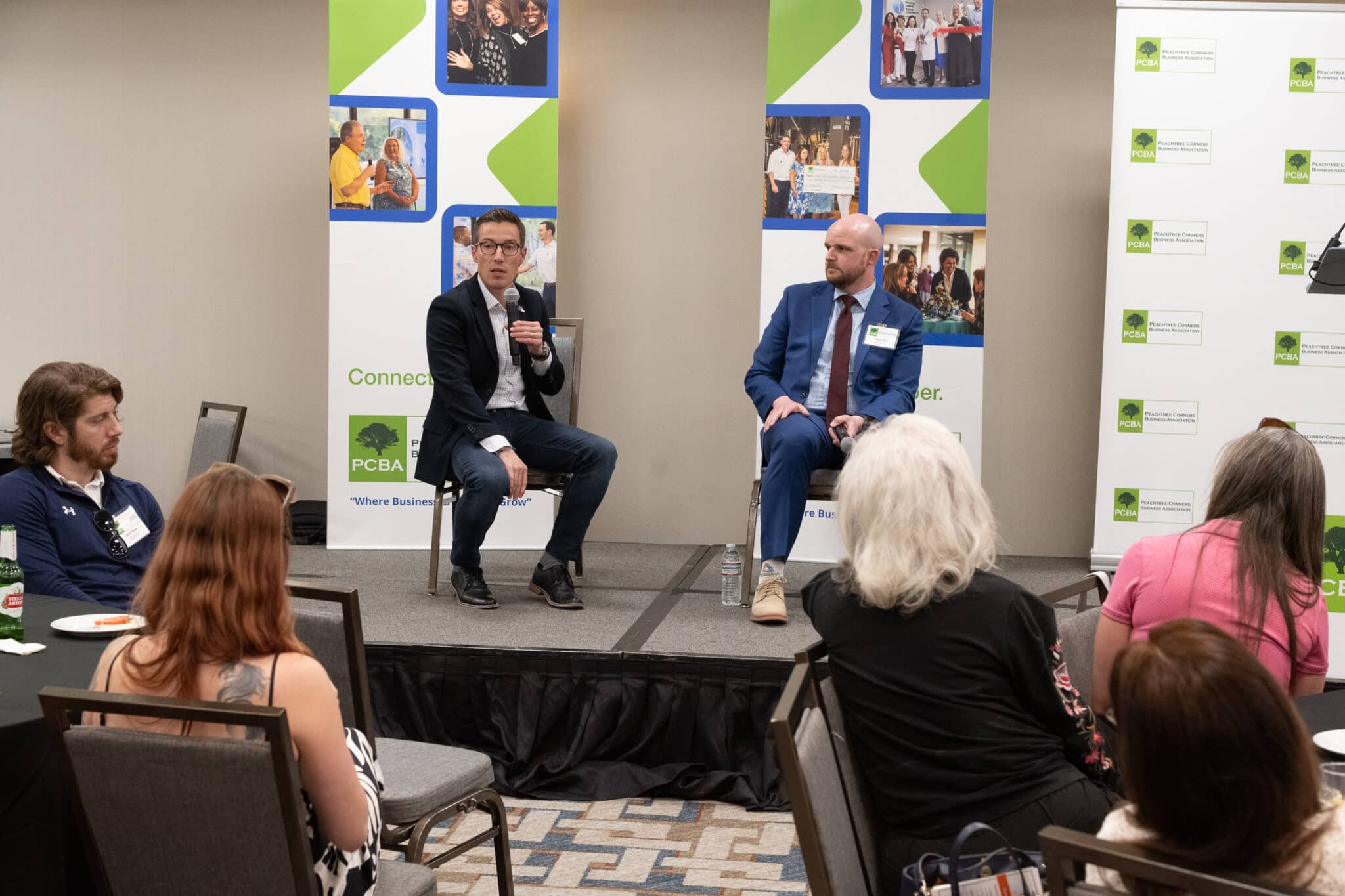
Most residents and business owners in Peachtree Corners probably think they know all about the economic development and strategic planning of Peachtree Corners, but do they really?
Peachtree Corners Business Association invited Peachtree Corners Economic Development Director Betrand Lapoire and Partnership Gwinnett Director of Economic Development Andrew Hickey to its After Hours Speaker Series on March 27 to discuss the city’s growth from a 1971 master plan to a bustling city with 42,000 inhabitants and 40,000 jobs.
Key points included the importance of business retention and expansion, with 24 projects last year creating 1,600 retained jobs, 1,600 new jobs and $250 million in new capital investment.
The Curiosity Lab, a world-class innovation center, was emphasized as a significant attraction. The city’s zoning and infrastructure plans were also discussed, focusing on balancing office and residential development to maintain a vibrant, sustainable community.
Matching jobs to residents
Although Peachtree Corners is just a teenager in terms of being an incorporated city, the foundation for this vibrant, fast-paced economic hub was laid more than 50 years ago by technology pioneer Paul Duke.
“Peachtree Corners was the first master-planned, business innovation technology park in metro Atlanta,” said Lapoire. “It was in response to the brain drain of technology with Georgia Tech graduates leaving the area.”
While the city may have a small-town feel, it’s the largest in Gwinnett County by population, but not land mass, he added.
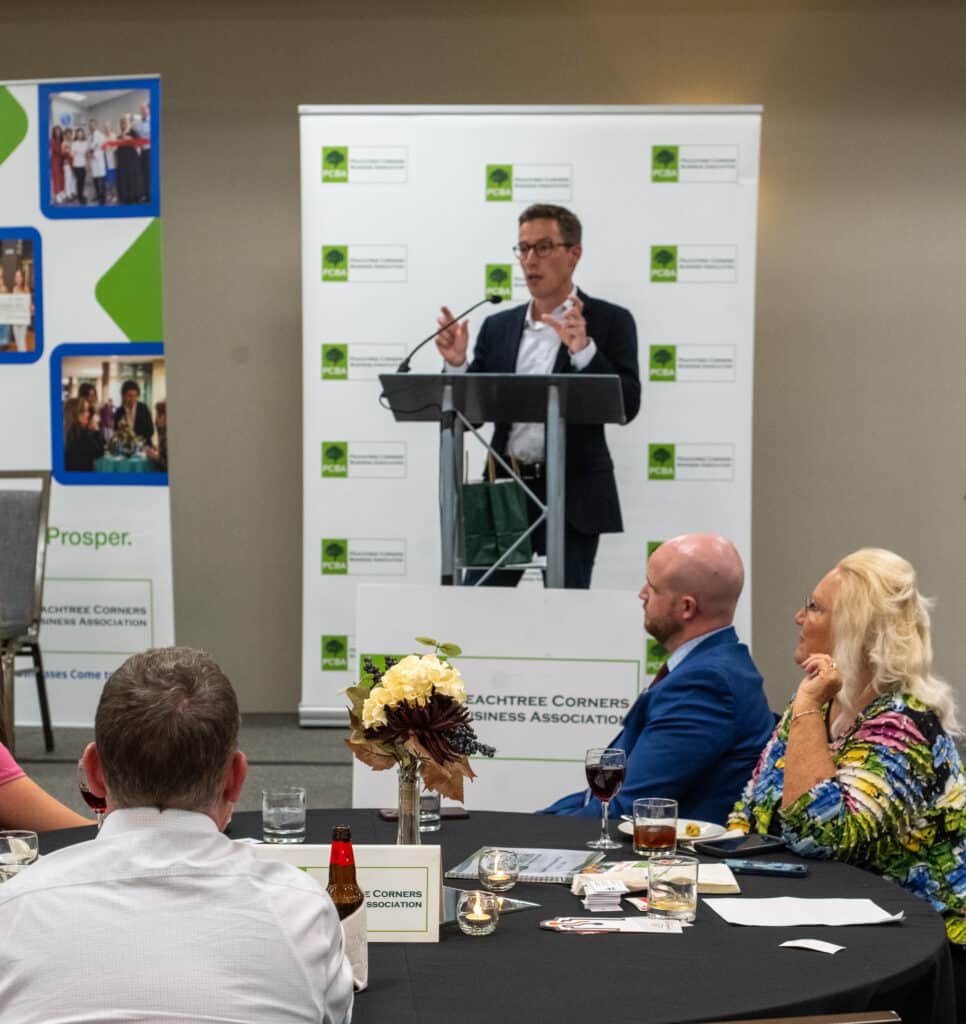
“The city started from a commercial, industrial, R&D base and then was expanded around it,” said Lapoire.
Though home to more than 42,000 residents, most of the jobs in Peachtree Corners are filled by people who live outside the city, he added.
“So we have this interesting mismatch, in a way, although not unusual,” said LaPoire. That creates traffic and transit issues. So that means that one of the solutions is to create more jobs here to fit the profile of the community.”
He presented charts that show professional services, consulting and engineering as the largest job categories. The next tier of businesses are wholesale and manufacturing.
“So we have a good mix of industry,” he said.
A five-year plan
The city has a five-year economic development plan (2023-2028) that outlines strategies for attracting and retaining businesses, with education and workforce development being key components.
Partnership Gwinnett has similar goals as Peachtree Corners, but on a larger scale.
“We are the county’s sales and marketing arm for all 17 cities now, and we receive funding from both municipal sources as well as existing businesses here — both in Gwinnett and outside of Gwinnett as well,” said Hickey.
He shared how Partnership Gwinnett is designed to drive a lot of major corporations toward doing business inside and with Gwinnett County.
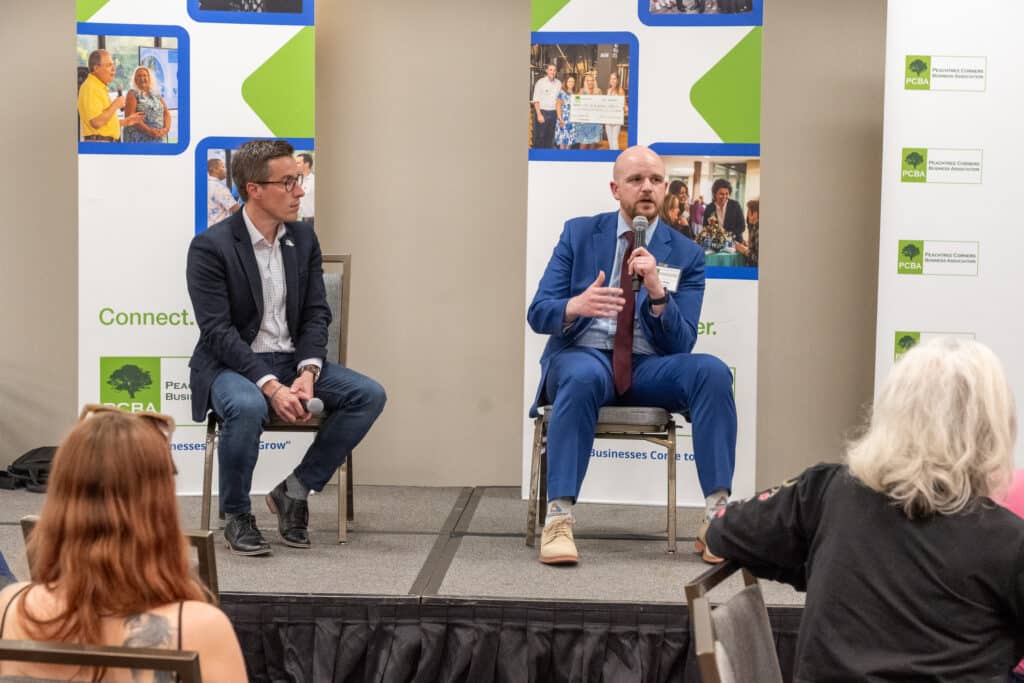
“One of the biggest things that we talk about that I’m sure it seems like most of us here, if you live here, you work here, you understand it. It’s the diversity that exists here in Gwinnett,” he said. “With a diversity index of 85, that means if we walk out of the Hilton here and we say hello to somebody, there’s an 85% chance they’re from a different ethnic or cultural background than ourselves, which to you and I may seem normal because that’s the life that we live in.”
He added that for companies, there’s a tremendous value in that, whether they have stated values, or they’re just making hiring decisions to get a wide range of candidates to fill those roles. Additionally, because of the proximity to Atlanta, Gwinnett County has a great labor draw.
Partnership Gwinnett
Partnership Gwinnett plays a significant role in recruiting businesses, expanding existing companies and developing the workforce. Hickey showed how the organization was involved with more than 24 projects last year.
“A majority of those were expansions, and that is a common thread you’ll see in economic development,” he said. “In business retention, expansion is so vital to working with our existing companies to make sure that they have the resources they need.”
He added that’s what leads to new investment and job creation in the community.
The organization also focuses on redevelopment projects, working with cities and the county to improve infrastructure and community amenities — especially strong educational institutions such Georgia Gwinnett College, Philadelphia College of Osteopathic Medicine and others.
Quality of life
In closing, both men stressed the importance of recruiting companies and developing the workforce, along with one aspect that means a lot but may not be as obvious — quality of life.
“It’s definitely evident that people like to work where they live — the whole live, work play experience,” said Hickey. “I joke that the part that people really have the most questions about, and are most excited to learn about, is new events at The Forum or Gwinnett Place Mall.”
Although they want to know what’s the next major company coming to Gwinnett, people REALLY want to know about how to spend their leisure time.
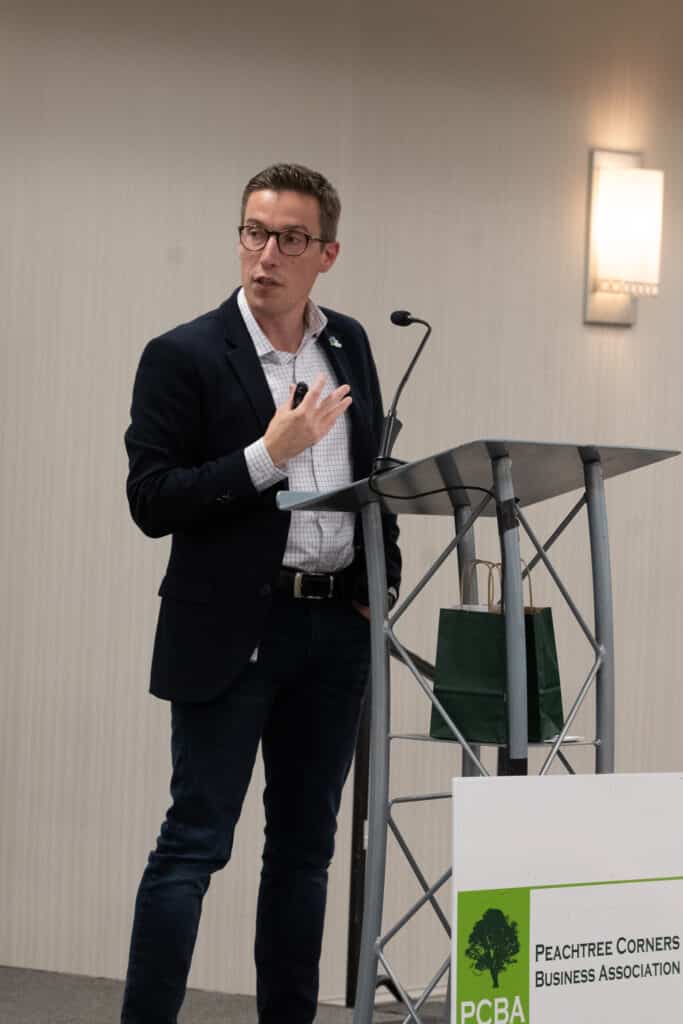
“That speaks to the importance of ensuring that we have a great community,” he said. “So at Partnership Gwinnett we work with all of our cities, and the county government as well, [on] a kind of a best-practices trip.”
He added that the peer tour allows everyone to know what the neighboring communities are doing and share the good news.
“We will take all of these elected officials, but also city staff, to different cities across the Southeast,” he said. “Last year, I believe they went to Huntsville, and have been to Greenville, Chattanooga — all cities that have done some really cool redevelopments that have taken their city to the next level. Our goal is to learn from them.”
Related
Business
Two Peachtree Corners Business Leaders Named Finalists for EY Entrepreneur Award
Published
3 weeks agoon
April 23, 2025
Ernst & Young’s Entrepreneur Of The Year celebrates ambitious entrepreneurs who are shaping the future
Ernst & Young LLP (EY US) recently announced the finalists for the prestigious Entrepreneur Of The Year 2025 Southeast Award, and two local, Peachtree Corners business leaders — David Quirk, president and CEO of DLB Associates Consulting Engineers PC and Erin Hanson, founder and CEO of Guardian Sports — made the list.
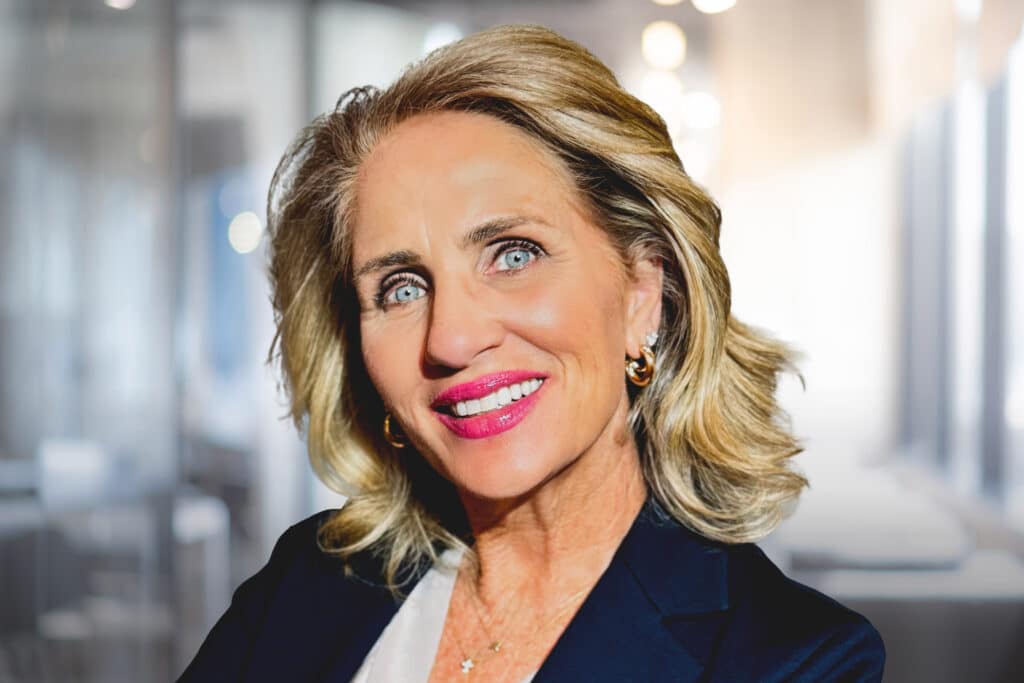
Hanson’s Guardian Sports is a family-owned company dedicated to serving athletes through safety and performance improvements in sports equipment. Major products include the Guardian Cap, PEARL ball and Guardian Infill serving the sports industry.

DLB Associates is a U.S.-based consulting engineering firm specializing in mission-critical and complex built environments. With more than 40 years of expertise, DLB delivers innovative, technology-driven solutions in engineering, commissioning and operations worldwide.
Celebrating entrepreneurial leaders
Now in its 40th year, Entrepreneur Of The Year recognizes the bold leaders who disrupt markets through the world’s most ground-breaking companies, revolutionizing industries and making a profound impact on communities. The program honors those entrepreneurs whose innovations shape the future and pave the way for a thriving economy and a hopeful tomorrow.
The Southeast program celebrates entrepreneurs from Alabama, Georgia, North Carolina, South Carolina and Tennessee.
An independent panel of judges selected 36 finalists for their entrepreneurial spirit, purpose, growth and lasting impact in building long-term value.
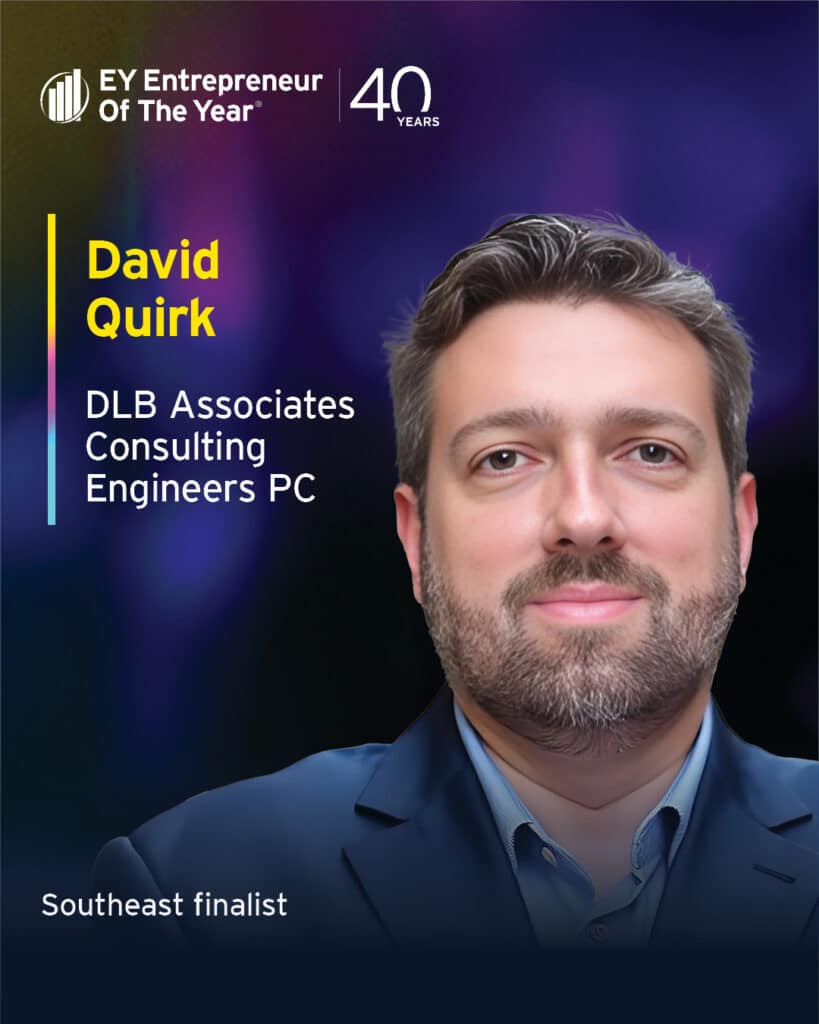

“This year’s finalists are leading examples of innovation, perseverance and resilience, illuminating paths to a brighter future for their industries and communities,” said Chevy Arnold, Entrepreneur Of The Year Southeast Program co-director.
“Their commitment to excellence transforms challenges into opportunities, inspiring us all,” added Kimberly Kicklighter, Entrepreneur Of The Year Southeast Program co-director.
Entrepreneur Of The Year honors many different types of business leaders for their ingenuity, courage and entrepreneurial spirit.
The program showcases original founders who bootstrapped their business from inception or who raised outside capital to grow their company; transformational CEOs who infused innovation into an existing organization to catapult its trajectory; and multigenerational family business leaders who reimagined a legacy business model to strengthen it for the future.
Including Quirk and Hanson, the 2025 Southeast finalists are:
- Marc Hodulich | 29029 | Atlanta, Georgia
- Damon Stafford | Alpine Intel | Charlotte, North Carolina
- Lou Hensley | Aspida | Durham, North Carolina
- Matthew Dent | Buffalo Rock Company | Birmingham, Alabama
- Melanie Little | Colonial Pipeline Company | Alpharetta, Georgia
- Will Bartholomew | D1 Training | Franklin, Tennessee
- Rene Diaz | Diaz Foods | Atlanta, Georgia
- David Quirk | DLB Associates Consulting Engineers PC | Peachtree Corners, Georgia
- Markus Scott | EyeQ Monitoring | Atlanta, Georgia
- Jon Gosier | FilmHedge | Atlanta, Georgia
- John Fitzpatrick | Force Marketing | Atlanta, Georgia
- Dr. Barry Patel | Galt Companies | Atlanta, Georgia
- Dr. Wade Smith | Galt Companies | Atlanta, Georgia
- Charles Gillespie | Gambling.com Group | Charlotte, North Carolina
- Kevin McCrystle | Gambling.com Group | Charlotte, North Carolina
- Mike Griffin | Griffin Brothers Companies | Cornelius, North Carolina
- Erin Hanson | Guardian Sports | Peachtree Corners, Georgia
- Dan Beem | Hissho Sushi | Charlotte, North Carolina
- Aaron Siegel | Home Team BBQ | Charleston, South Carolina
- Marc Murphy | Ignite Digital Services | Charleston, South Carolina
- Miller Chalk | Inglett & Stubbs, LLC | Mableton, Georgia
- Liza Rodewald | Instant Teams | Southern Pines, North Carolina
- Stephen Andresen | McClancy Foods & Flavors | Fort Mill, South Carolina
- Travis LeFever | Mission Mobile Medical Group | Greensboro, North Carolina
- Cyrus Mojdehi | Northway Homes | Charlotte, North Carolina
- Connor Ryan | NutraSky | Alpharetta, Georgia
- Fritz Owens | OTR Solutions | Roswell, Georgia
- Christopher Chuang | Relay, Inc. | Raleigh, North Carolina
- Kurt Jacobus | restor3d, Inc. | Durham, North Carolina
- Tom Kendrot | Shearwater Health | Nashville, Tennessee
- Teak Shore | Southern Lighting Source | Cumberland, Georgia
- Cindy Eckert | Sprout Pharmaceuticals | Raleigh, North Carolina
- Bryan Moore | TalkShopLive Inc. | Nashville, Tennessee
- Tina Moore | TalkShopLive Inc. | Nashville, Tennessee
- Igor Marinelli | Tractian | Atlanta, Georgia
- Joan Butters | Xsolis | Franklin, Tennessee
You can learn more about the finalists at ey.com/en_us/entrepreneur-of-the-year-us/southeast/winners-finalists.
Regional award winners will be announced on June 25 during a special celebration. The winners will then be considered by the national independent panel of judges for the Entrepreneur Of The Year National Awards, which will be presented in November at the annual Strategic Growth Forum®, one of the nation’s most prestigious gatherings of high-growth, market-leading companies.
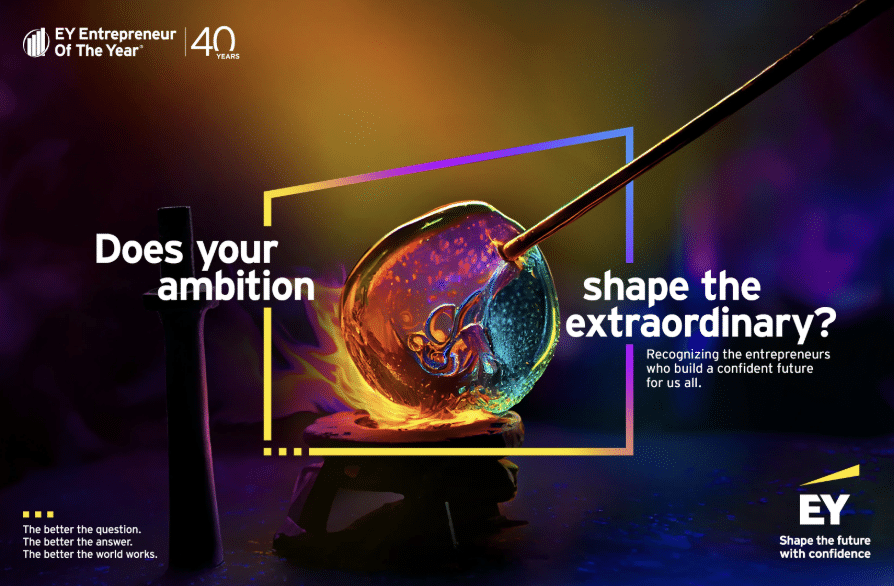
About Entrepreneur Of The Year
Founded in 1986, Entrepreneur Of The Year has celebrated more than 11,000 ambitious visionaries who are leading successful, dynamic businesses in the U.S., and it has since expanded to nearly 60 countries globally.
The U.S. program consists of 17 regional programs whose panels of independent judges select the regional award winners every June. Those winners compete for national recognition at the Strategic Growth Forum® in November where national finalists and award winners are announced.
The overall national winner represents the U.S. at the EY World Entrepreneur Of The Year™ competition.
For more about the award, visit ey.com/us/eoy.
Related
Business
SCB Construction Group Partners with CGA Reps on New Peachtree Corners HQ
Published
4 weeks agoon
April 15, 2025
SCB Construction Group, freshly rebranded from SteelCo, secures construction project with CGA Reps for new office HQ in Peachtree Corners
SCB Construction Group has announced a strategic partnership with CGA Reps to build a new office headquarters in Peachtree Corners. The project, encompassing approximately 26,000 square feet of innovative workspace, marks a significant milestone in advancing CGA Reps’ corporate vision while showcasing SBA Construction Group’s commitment to delivering transformative construction solutions.
In collaboration with Oakley Real Estate Partners — serving as developers of the project on behalf of CGA Reps — this venture reflects a united effort to bring cutting-edge design (from Smallwood architecture firm) and operational excellence to the commercial kitchen equipment industry.
The announcement follows several high-profile projects for SCB Construction Group in 2024, including a 72,500-square-foot manufacturing center and headquarters for Process Equipment & Controls, an impressive interior build-out for Courtesy Ford Conyers’ commercial service center and the Phase 1 completion for StoreEase Loganville — recently honored as a 2024 Smart Facility of the Year by Modern Storage Media.
A bold new chapter for CGA Reps
The new 25,890-square-foot headquarters is designed to be more than just a workplace — it is envisioned as an inspiring environment that serves both client engagements and employee creativity. CGA Reps is recognized as an industry expert in commercial kitchen equipment, representing leading manufacturers, warehousing, distributing and installing everything from fryers to commercial walk-in freezers.
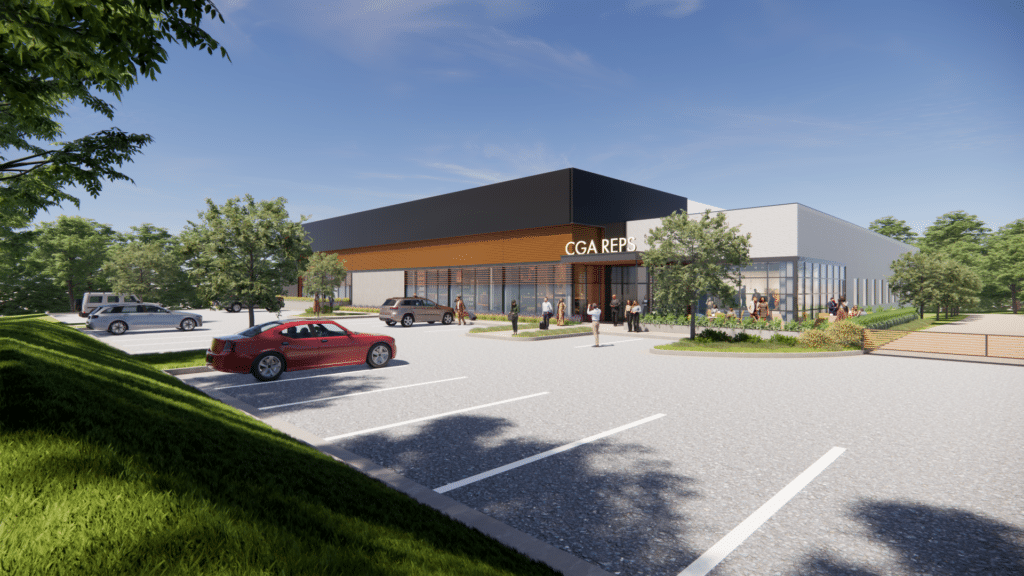
The facility’s design reflects this expertise, featuring a dedicated approximately 9,000-square-foot showroom kitchen that will host equipment demonstrations, tradeshows and webinars. This dynamic space will allow CGA Reps to showcase its comprehensive product range and provide clients with hands-on experiences of the latest commercial kitchen innovations.
A standout feature of the project is its innovative approach to stormwater management. With the site comprising only three acres, sufficient space for a traditional detention pond does not exist. To overcome this challenge, the design includes an underground detention system located beneath the truck court to efficiently handle all stormwater runoff.
This solution not only maximizes the use of the available land but also reinforces CGA Reps’ commitment to sustainable practices.
“We are excited to embark on this project with CGA Reps,” said Jay Bailey, CEO of SCB Construction Group. “This partnership underscores our commitment to customer excellence in design and construction, and it is a testament to the trust our clients place in our ability to deliver projects that not only meet but exceed expectations.”
Delivering excellence through proven expertise
SCB Construction Group’s track record in 2024 has been nothing short of remarkable. Earlier in the year, the company completed a 72,500 square foot manufacturing center for Process Equipment & Controls, integrating office space within a dynamic production facility.
This project was celebrated for its innovative design that balanced operational efficiency with a modern aesthetic, utilizing IMP panels to mimic tilt-up concrete, setting new standards for manufacturing environments.
Similarly, the interior build-out for Courtesy Ford Conyers’ commercial service center demonstrated SCB Construction Group’s ability to transform conventional spaces into functional and attractive environments that cater to both customer and staff needs.
The company’s commitment to quality and precision was again evident in the successful Phase 1 completion for StoreEase Loganville. This project, which recently earned the distinction of a 2024 Smart Facility of the Year by Modern Storage Media, highlights SCB Construction Group’s forward-thinking approach to construction and design, incorporating smart technologies and design that enhance sustainability and operational efficiency.
A rebranding that reflects a vision for the future
In a move that signals its evolution and growth, SCB Construction Group has recently rebranded from its former identity, SteelCo Buildings, as it spins off its construction division. This strategic rebranding is not merely cosmetic — it represents a renewed commitment to capabilities, credibility and client-focused service.
The refreshed brand is anchored by a new tagline “Deep Expertise, High Expectations” and a clear brand promise that communicates the company’s mission: to craft exceptional construction experiences based on precision, innovation and trust.
“Our rebranding is about more than just a new name or logo; it’s a renewed promise to our clients and communities,” explained Robert Lee, marketing director at SCB Construction Group. “We believe that our updated brand identity, including our invigorated tagline and mission statement, encapsulates our dedication to pushing the boundaries of design and construction. It reflects our commitment to creating spaces that are as inspiring as they are functional.”
Transforming spaces to inspire and connect
The new headquarters for CGA Reps is expected to become a landmark facility in Peachtree Corners. Beyond its impressive architectural design and advanced construction techniques, the building is planned as a hub for innovation and collaboration.
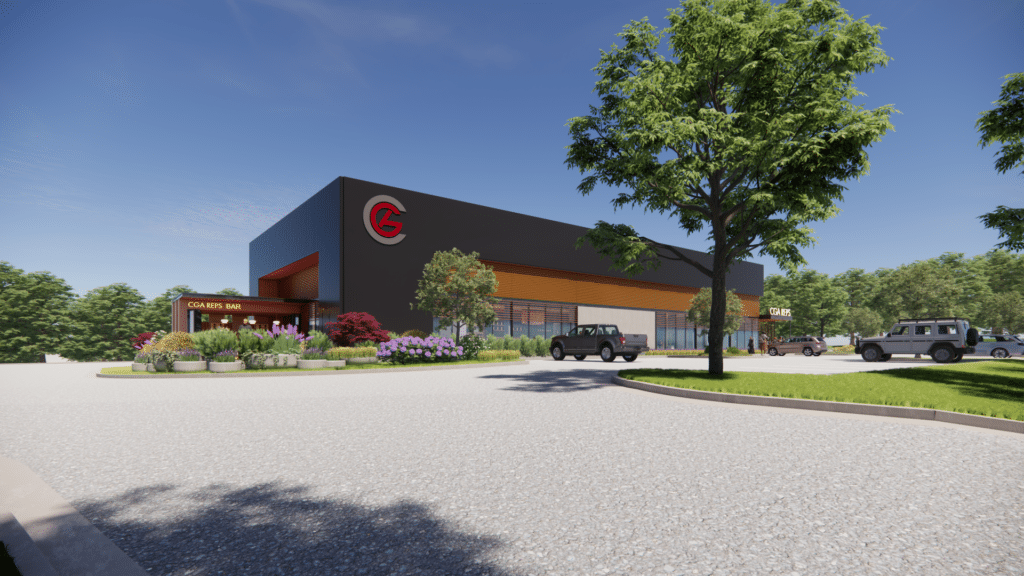
The interior build-out will include dynamic client reception areas, interactive meeting rooms, and dedicated spaces designed to foster creativity and teamwork among employees. The layout is crafted to ensure that every area of the facility contributes to a productive and inspiring work environment.
“By investing in this state-of-the-art facility, CGA Reps is making a strong statement about the future of work,” said Bryan Young, VP of construction at SCB Construction Group. “Our team is dedicated to designing and building spaces that not only serve the immediate needs of our clients but also create environments that motivate and inspire. The new headquarters will be a testament to that vision.”
Looking ahead
The partnership between SCB Construction Group and CGA Reps marks a significant step forward for both companies. As SCB Construction Group continues to build on its legacy of excellence and innovation, this project is poised to set a new benchmark for modern office headquarters design in the region.
With a strategic focus on creating spaces that inspire, connect and drive success, the future looks promising for both SCB Construction Group and its esteemed partner, CGA Reps.
For more information on the new headquarters project or to learn more about SCB Construction Group’s portfolio, visit scbcg.com.
Related
Read the Digital Edition
Subscribe
Keep Up With Peachtree Corners News
Join our mailing list to receive the latest news and updates from our team.
You have Successfully Subscribed!

Digital Edition

Official City Merchandise Line Debuts This Saturday at Town Green

Paul Duke STEM High School Student Earns CGO Scholarship

World Blood Donor Day Starts Here: Theo’s Miracle, Katherine’s Mission [Podcast]

Executive Function: A Tribute to Working Moms

Peachtree Corners Grows Business Opportunities Through Economic Development

Peachtree Corners Hosts Discussion About the Future of Local Policing

Simpson Elementary Marks Exceptional Children’s Week

Atlanta’s Dog Howl-O-Ween Festival Moving to Peachtree Corners for 2025

D1 Training Brings New Fitness Concept to Peachtree Corners

Peachtree Corners Hosts Discussion About the Future of Local Policing

City of Peachtree Corners Awarded Certificate of Achievement From GFOA for Seventh Straight Year

Simpson Elementary Marks Exceptional Children’s Week

Executive Function: A Tribute to Working Moms

Official City Merchandise Line Debuts This Saturday at Town Green

Peachtree Corners Grows Business Opportunities Through Economic Development

Light up the Corners [Video]

Capitalist Sage: Business Leadership in Your Community [Podcast]

Cliff Bramble: A Culinary Adventure through Italy

Top 10 Brunch Places in Gwinnett County

A Hunger for Hospitality

THE CORNERS EPISODE 3 – BLAXICAN PART 1

Top 10 Indoor Things To Do This Winter

The ED Hour: What it takes to Remove Barriers from Education







